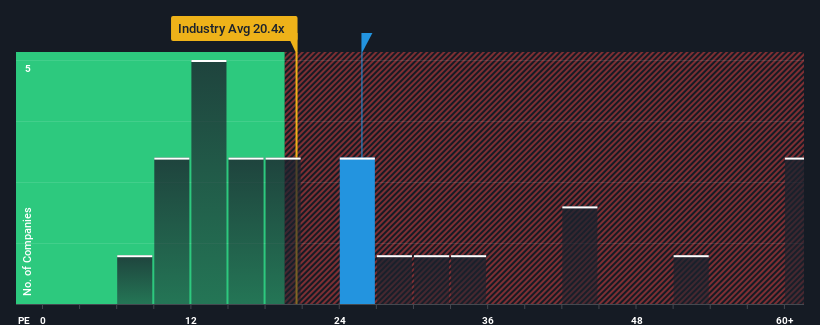- China
- /
- Basic Materials
- /
- SHSE:600724
Ningbo Fuda Company Limited's (SHSE:600724) Business And Shares Still Trailing The Market
With a price-to-earnings (or "P/E") ratio of 25.8x Ningbo Fuda Company Limited (SHSE:600724) may be sending bullish signals at the moment, given that almost half of all companies in China have P/E ratios greater than 33x and even P/E's higher than 61x are not unusual. Nonetheless, we'd need to dig a little deeper to determine if there is a rational basis for the reduced P/E.
We'd have to say that with no tangible growth over the last year, Ningbo Fuda's earnings have been unimpressive. One possibility is that the P/E is low because investors think this benign earnings growth rate will likely underperform the broader market in the near future. If not, then existing shareholders may be feeling optimistic about the future direction of the share price.
View our latest analysis for Ningbo Fuda

Is There Any Growth For Ningbo Fuda?
In order to justify its P/E ratio, Ningbo Fuda would need to produce sluggish growth that's trailing the market.
Taking a look back first, we see that there was hardly any earnings per share growth to speak of for the company over the past year. Whilst it's an improvement, it wasn't enough to get the company out of the hole it was in, with earnings down 50% overall from three years ago. So unfortunately, we have to acknowledge that the company has not done a great job of growing earnings over that time.
Comparing that to the market, which is predicted to deliver 38% growth in the next 12 months, the company's downward momentum based on recent medium-term earnings results is a sobering picture.
With this information, we are not surprised that Ningbo Fuda is trading at a P/E lower than the market. Nonetheless, there's no guarantee the P/E has reached a floor yet with earnings going in reverse. There's potential for the P/E to fall to even lower levels if the company doesn't improve its profitability.
The Key Takeaway
We'd say the price-to-earnings ratio's power isn't primarily as a valuation instrument but rather to gauge current investor sentiment and future expectations.
As we suspected, our examination of Ningbo Fuda revealed its shrinking earnings over the medium-term are contributing to its low P/E, given the market is set to grow. Right now shareholders are accepting the low P/E as they concede future earnings probably won't provide any pleasant surprises. If recent medium-term earnings trends continue, it's hard to see the share price moving strongly in either direction in the near future under these circumstances.
We don't want to rain on the parade too much, but we did also find 2 warning signs for Ningbo Fuda (1 is concerning!) that you need to be mindful of.
Of course, you might also be able to find a better stock than Ningbo Fuda. So you may wish to see this free collection of other companies that have reasonable P/E ratios and have grown earnings strongly.
Valuation is complex, but we're here to simplify it.
Discover if Ningbo Fuda might be undervalued or overvalued with our detailed analysis, featuring fair value estimates, potential risks, dividends, insider trades, and its financial condition.
Access Free AnalysisHave feedback on this article? Concerned about the content? Get in touch with us directly. Alternatively, email editorial-team (at) simplywallst.com.
This article by Simply Wall St is general in nature. We provide commentary based on historical data and analyst forecasts only using an unbiased methodology and our articles are not intended to be financial advice. It does not constitute a recommendation to buy or sell any stock, and does not take account of your objectives, or your financial situation. We aim to bring you long-term focused analysis driven by fundamental data. Note that our analysis may not factor in the latest price-sensitive company announcements or qualitative material. Simply Wall St has no position in any stocks mentioned.
About SHSE:600724
Ningbo Fuda
Engages in the urban commercial real estate operation and management in China.
Excellent balance sheet average dividend payer.
Market Insights
Community Narratives



